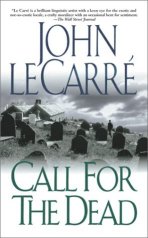
Call for the Dead
John Le Carré
157 pages
published in 1961
This is the book that introduced George Smiley to the world, the later star of books like Tinker Tailor Soldier Spy and The Honourable Schoolboy. It was also John Le Carré's first novel. As such it is interesting to see how accomplished a writer Le Carré already was as well as see the evolution Smiley has undergone between this and the later, more well-known novels in which he appeared.
In fact, George Smiley appears almost fully formed in Call for the Dead. The introduction Le Carré gives him, in the first chapter, A Brief History of George Smiley is exemplary: "When Lady Ann Sercomb married George Smiley towards the end of the war she desvribed him to her astonished Mayfair friends as breathtakingly ordinary." The rest of the chapter makes it clear that already, in his first appearance was as jaded, brilliant but lonely and plagued by his superiors as he was later.
George Smiley, it appears, was one of the people recruited at Oxford before the war, when the British secret service was still endearingly amateur and could still afford to be so. It was toughened up and professionalised during the war and George Smiley with it. Nevertheless, he is somewhat out of place in this newer, more professional secret service, a service that had become institutionalised by the Cold War, a secret service where the old boys network has partially giving way to the people of the grammar schools, the professional bureaucrats.
One of the themes in Call for the Dead, as well as its sequel, as we will see, is the disappearance of the old Britain with its traditional, unchanging values and the appearance of a new, less secure Britain with new, as yet unclear values. It's a more unconscious than conscious theme, a theme forced upon it as much by the times in which it was written as by the author himself. Call for the Dead is, as the cliche goes, very much a product of its time. In this case the cliche is just a simple statement of fact. Both this and A Murder of Quality take place in a Britain in which the old (class) strictures had not yet disappeared and the new possibilities had not yet opened up. It is this setting that gives both novels their peculiar atmosphere.
Call for the Dead, though set in a secret service environment, is largely a standard mystery novel. After a routine security check by George Smiley, Samuel Fennan of the Foreign Office killed himself, though Smiley had already let him known that he was in the clear. One clue emerges when Smiley visits Fennan's widow and by pure accident receives a phone call Fennan had asked for before his death. Smiley quickly realises that Fennan's suicide is nothing of the sort and foul play is afoot. And part of the solution seems to lie in Smiley's past...
Again, like he appears in later novels, Smiley is a reluctant hero and the resolution of the mystery offers little comfort to him. The whole affair is sordid and disgusting, a pointless waste of lives. It's this sense of morality that let's John Le Carré's novels stand out from the ordinairy spy thrillers, a moral sense already present here. Call for the Dead is less complex and more straight forward than Le Carré's later novels and the atmosphere is more oppressive; as I said before, this is set in an England closed in on itself still, halfway between the old securities and the new freedoms.
If you are looking for the same sort of novel as Tinker Tailor Soldier Spy or The Honourable Schoolboy, you will probably be disappointed with Call for the Dead; it is however still an excellent novel in its own right and an interesting look at an earlier version of George Smiley.
